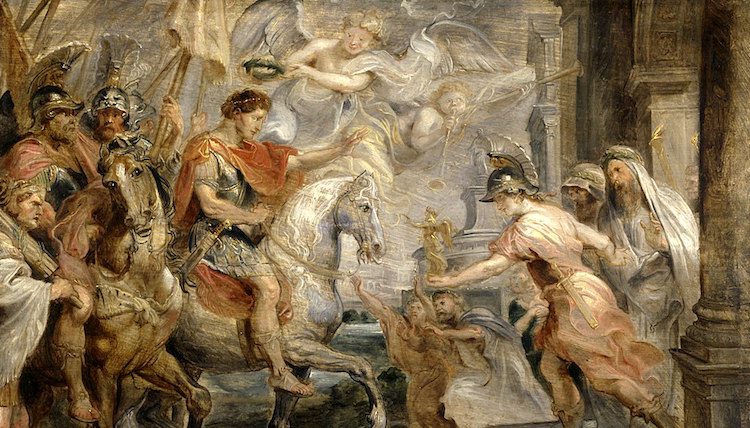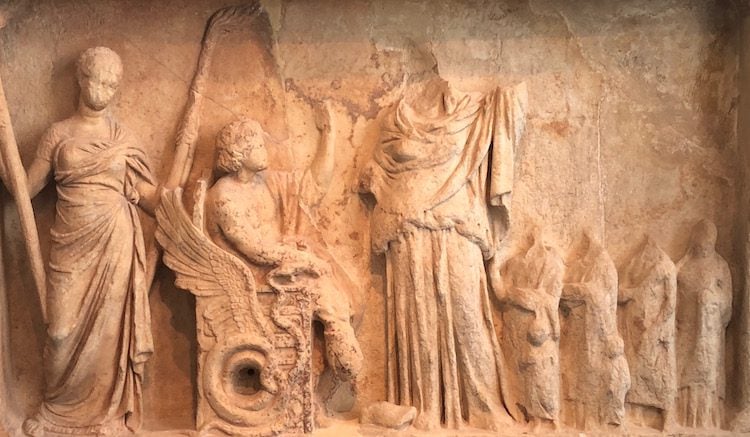Bart Ehrman is by far my favorite New Testament scholar. When I saw he was publishing a book on the rise of Christianity, I was excited, and curious to see how he would tackle this subject. Like all his previous works, Triumph of Christianity: How a Forbidden Religion Swept the World, is a digestible entry into the matter. I recommend you read it if you want to learn about this topic.
This entry of the Hearth of Hellenism is just a reflection on the topic of Christianization in the Roman world which were prompted by based on some material I read from Triumph of Christianity. My primary goal for reading Triumph of Christianity was to see how far Bart would go in recognizing the horror that the rise of Christianity was. I say horror because what happened to the “pagans,” the people who followed their ancestral religions was nothing short of an ethnocide/genocide. Christianity, with state support, sought to eliminate their opposition through any means necessary. Christian leaders hated Greeks and believed the empire had to be purged clean of their false religion and culture.

How would Bart deal with this Christian terrorism that plagued the Roman Empire? Bart touches on the subject a little in the introduction and dedicates a chapter towards the end of the book dubbed “Conversion and Coercion.” At the end of his summation of this chapter, Bart says “Paganism did not have to be destroyed by violent acts of Christians intolerance. It could, and did, die a natural death cut off from resources and abandoned by popular opinion.” I find this conclusion to be very soft and too neutral. I expected as much, how far would a New Testament scholar go side with polytheism? Academia has, in my opinion, has difficulty overall with giving any real sympathy for the pagans. It seems that what happened was just some sort of natural transformation and we really should not feel too bad or blame the Christians or the Emperors all that much in the end.
When Ehrman says “die a natural death cut off from resources and abandoned by popular opinion” is a nice way to say paganism starved to death. This can explain why it took many centuries for Christianity to eliminate their enemies. Starvation in this context is not a natural death by any stretch of the imagination though. Describing it in such bland terms that Ehrman uses overlooks what happened with the rise of Christianity. I think much of the issue regarding this subject stem from not orienting ourselves properly towards the destructive nature replacing traditional religions is. Because it is merely not just a religion that is replaced, but also an ethnic group’s identity is eliminated in the process. This fact seems not to get enough attention or is not stressed enough.
Conversion to Christianity kills your native identity in a nutshell. This may not have been the case in the first or second centuries – but once Christianity rises to the top of the government structure and that government gives support to only one religion and outlaws everything else, what do you think is going to happen?

Why do I say Christianization of the empire was a genocide? Under Article II of the Convention on the Prevention and Punishment of the Crime of Genocide “intent to destroy, in whole or in part, a national, ethnical, racial or religious group, as such” is a “mental element” of genocide. To become Christian meant giving up your ethnic identity and your heritage. In the case of Greeks, to become Christian meant to give up Hellenism, a Greek’s ethnic way of life, and cultural identity. Their gods were not allowed to be worshiped, temples destroyed, books burned, and the closure of centers of learning all constitute an attack on a people with the intent to destroy. The intent is clear as day in the historical record. Non-Christians were indeed singled out and murdered, but what was more detrimental was the cultural destruction Hellenism which was attacked and replaced with Christinaity.
I also want to reference Article 7 of a 1994 draft of the United Nations Declaration on the Rights of Indigenous People it stated that Indigenous People have the collective and individual right not to be subjected to ethnocide and cultural genocide:
(a) Any action which has the aim or effect of depriving them of their integrity as distinct peoples, or of their cultural values or ethnic identities;
(b) Any action which has the aim or effect of dispossessing them of their lands, territories or resources;
(c) Any form of population transfer which has the aim or effect of violating or undermining any of their rights;
(d) Any form of assimilation or integration by other cultures or ways of life imposed on them by legislative, administrative or other measures;
(e) Any form of propaganda directed against them.
Many of these criteria apply when we discuss Christianization of the Roman world. The religions and way of life of the people of the Roman world were the indigenous religions of the inhabitants of the empire. I will discuss only the first two to not make this blog excessively long.
1. Any action which has the aim or effect of depriving them of their integrity as distinct peoples, or of their cultural values or ethnic identities.
The numerous Imperial laws which ban ethnic religion and exclude non-Christians from high positions in the imperial administration, military and education satisfy this. Here is a list of some laws which demonstrate “intent to destroy, in whole or in part, a national, ethnical, racial or religious group, as such.” Non-Christians could not pass down inheritances to their children and could lose their property for violating these laws.
Here is a short list of imperial legislation against Hellenism found in The Passion of the Greeks: Christianity and the Rape of the Hellenes by Evaggelos Vallianatos.
320: Domestic sacrifice prohibited
(Emperor Constantine, December 17, 320, Theodosian Code [ThC], 16.10.1)
346: Shutting down the temples and sacrifices
Temples shall be closed “in all places and all cities.” All men “shall abstain from sacrifices.” Anyone who commits the crime of offering sacrifice to the gods, “he shall be struck down with the avenging sword.” (Emperors Constantius and Constans, December 1, 346, ThC., 16.10.4)
380: Christianity the Religion of the Roman Empire
All people in the Roman Empire “shall practice that religion which the divine Peter the Apostle transmitted to the Romans.” We consider the non-Christians “demented and insane.” They will suffer “the heretical dogmas.” (Emperors Gratian, Valentinian and Theodosios, February 28, 380, ThC., 16.1.2)
381: Sacrifice Forbidden
Sacrifices are forbidden by day or night. No “madman” or “sacrilegious person” ought to attempt, or think of, approaching any shrine or any temple for preforming criminal sacrifice. (Emperors Gratian, Valentinian and Theodosius, December 21, 381, ThC., 16.10.7)
392: No more worship of the household gods
No person will, “by more secret wickedness, venerate his lar with fire, his genius with wine, his penates with fragrant odors; he shall not burn lights to the them, place incense before them, or suspend wreaths for them.” Those guilty of violating Christianity, will be punished with confiscation of their house or land in which they practiced their “pagan superstition.” (Emperors Theodosios, Arcadius and Honorius, November 8, 392, ThC., 16.10.12)
396: End of the Eleusinian Mysteries
All privileges ever granted to civil priests, ministers, prefects, or hierophants of the sacred Eleusinian mysteries are “completely abolished” – the law now condemns their professions. (Emperors Arcadius and Honorius, December 7, 396, ThC 16.10.14)
416: No pagans need apply for government jobs
No pagan may join the imperial government service or “be honored with the rank of administrator or judge.” (Emperors Honorius and Theodosius II, December 7, 416, ThC 16.10.21)
484: Killing Hellenism
Bishops and government agents should find and punish teachers of Hellenic studies. They should not be allowed to teach, least they corrupt their students. Bishops and government agents should put Greek teachers out of business, bringing the “impieties” of Hellenism to an end. No one shall leave a gift or bequeath anything to Greeks or to schools, and other institutions supporting the “impiety” of Hellenism. All previous legislation against the “error” of the Greeks I reaffirmed. (Emperor Zeno, C 482-484, Codex Iustinianus 1.11.9-10)
These laws have been largely dismissed, as spotty enforced and that the constant reaffirmation showed their ineffectiveness. Regardless of the effectiveness, these laws demonstrate state-sponsored anti-Hellenic actions with intent to do harm to non-Christians. I think most are not able don’t grasp the severity of this because it is presented as attacking “pagans” – a term which I reckon does not resonate sympathy with modern readers. When you label and talk about the people of the Roman Empire, the non-Christians as “pagan” – they become faceless, what does it mean to the average person? Pagan largely has no meaning to most people. However, when you read the law codes directly they don’t say pagan, they say Greek. These laws attacked Greeks (Hellenes) and anyone who partakes in the Greek way of life (Hellenism).

2. Any action which has the aim or effect of dispossessing them of their lands, territories or resources;
The agrarian/religious system of the Greeks was under constant attack by Christianity. I wish I had time to go into explaining the agricultural system in Greece and its importance in economic/political/religious terms. This requires analysis from classical Greece to Byzantium, and I don’t have the space for that here. In simple terms, the Greek identity and sense of freedom were deeply tied to their land. The land had economic, political, and religious significance. When Rome conquered Greece, over time, land ownership became consolidated – creating large landowners. A somewhat good analogy would be what Walmart has done to mom and pop shops when they enter rural communities.
Jumping a little forward, the trend of large land ownership persisted. With the rise of Christianity and forward, churches gained control over land, replacing temples as they were destroyed. Imperial estates would be sold to the Church or the aristocracy, who then exploited the poor. In the West, Pope Gregory the Great, enslaved peasants to owners of plantations, setting up Western Europe for feudalism, the world’s most oppressive agrarian, social, and political system.
Bishops demanded the Greek stop celebrating their festivals. Festivals for Dionysus that connected the people to their land, framing, and harvest. It took centuries to accomplish this, Dionysus was worshipped as late as the twelfth century! Removing Dionysus was essential for breaking the Greek farmer’s spirit and happiness (theatre attendance was also banned/condemned, another attack on Dionysus).
George Gemistos Plethon (1355-1452) the Platonic philosopher in Constantinople pushed the Emperor to end the plantations in the Peloponnese and reintroduce an agrarian republic (based on the Greek model), ending the large land ownership and landless peasant problem. Even more radical, Plethon advocated for the reestablishment of the Greek gods and culture.
The Emperor did nothing, the ghosts of Hellenism, an agrarian republic, and the Gods were both too much for consideration. The Greek way of life was too alien by this point for anyone in power to consider it a viable reality anymore. Public ethnic Greek identity was gone thanks to centuries of persecution and cultural destruction. What the people had become were Roman Christians. The so-called Byzantine Empire, which is characterized as “Greek,” was far from Greek, the people called themselves Romaioi. Greek was not a viable self-identity. The “triumph” was secured thanks to the intentional destruction of the Greek people. A “natural death” it was not.

















